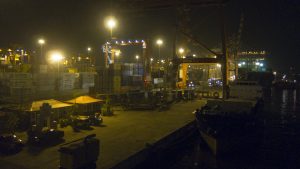Despite hectic diplomatic engagement with Sri Lanka in the recent past, a key Indian project in the island nation now stands cancelled. The Sri Lankan cabinet announced on February 1 that the country will operate the East Container Terminal (ECT) in the Colombo port as “a wholly owned” facility, going against a 2019 agreement that would have seen the ECT developed in a three-way partnership between India, Japan, and Sri Lanka. The Hindu, reporting on the development, had noted an Indian government source as saying about the possibility of Sri Lanka reneging on the 2019 Memorandum of Understanding: “We would hope that Sri Lanka does not unilaterally decide on this matter, as there is a tripartite agreement on it.”
The newspaper also noted that pressure from Sri Lankan port workers had led the ruling dispensation in Colombo to take this decision, which is likely to further complicate India-Sri Lanka ties. According to the 2019 agreement, while Sri Lanka would retain majority stakes in the ownership of the terminal, the facility would be operated by the Indian multinational Adani Group – a point of contention between Sri Lanka port workers and the Rajapaksa government. As I had noted in an earlier article on the issue, the whole saga once again illustrates the complex relationship between domestic and international politics in South Asia, and how local political incentives and push-and-pull shape the latter.
Earlier in January, Indian External Affairs Minister S. Jaishnakar had visited Sri Lanka amid concerns about the prospects of the ECT. Press reports around Jaishankar’s visit had noted that its agenda would include pushing the Sri Lankan government to go ahead with the ECT agreement.
However, other irritants in India-Sri Lanka relations have also resurfaced, including differences around the Rajapaksa government’s treatment of the island’s Tamil minorities — in particular, its proposal to scrap a key constitutional amendment, arising out of a 1987 India-Sri Lanka agreement, that guarantees a degree of power devolution, and therefore acts to protect the Tamils in the Sinhalese-majority nation.
A recent dispute around the deaths of four Indian fishermen in the Palk Straits – which has served as a point of India-Sri Lanka friction in the past – also stands to add complications to the already frail relationship. The Indian state of Tamil Nadu goes to polls this spring – elections in which the Bharatiya Janata Party seeks to improve its fortunes against odds. Given this, the Narendra Modi government in New Delhi would be particularly mindful of any downstream electoral consequence of its Sri Lanka policy.
While the ECT decision does not stand to affect domestic politics in India at all, its role as a pile-on to the growing list of differences between India and the Rajapaksa government may rock the fragile equilibrium between the two that set in since Gotabaya Rajapaksa assumed the Sri Lankan presidency in 2019. As president, his brother – and now prime minister – Mahinda Rajapaksa had actively courted a greater Chinese presence in the island, raising alarm in New Delhi. However, since coming back to power less than two years ago, the Rajapaksas have nominally corrected course in a way that have assuaged some of the Modi government’s concerns, before the latest round of problems in the relationship surfaced.
Instead of the ECT, the Sri Lankan government has offered another shipping terminal on the western side of the port for development by foreign actors.

































